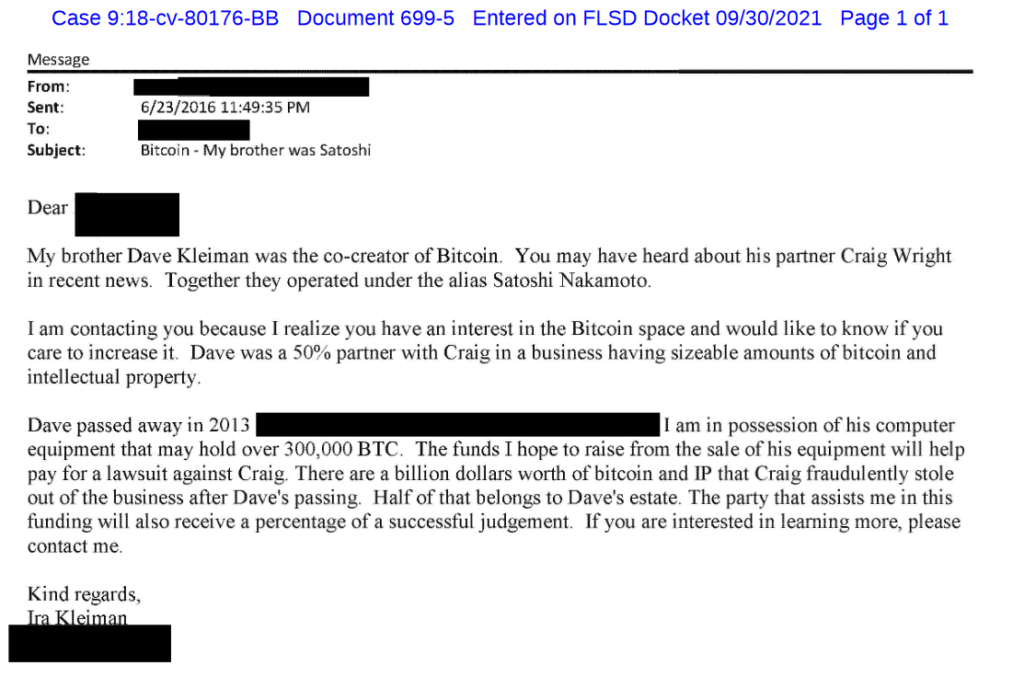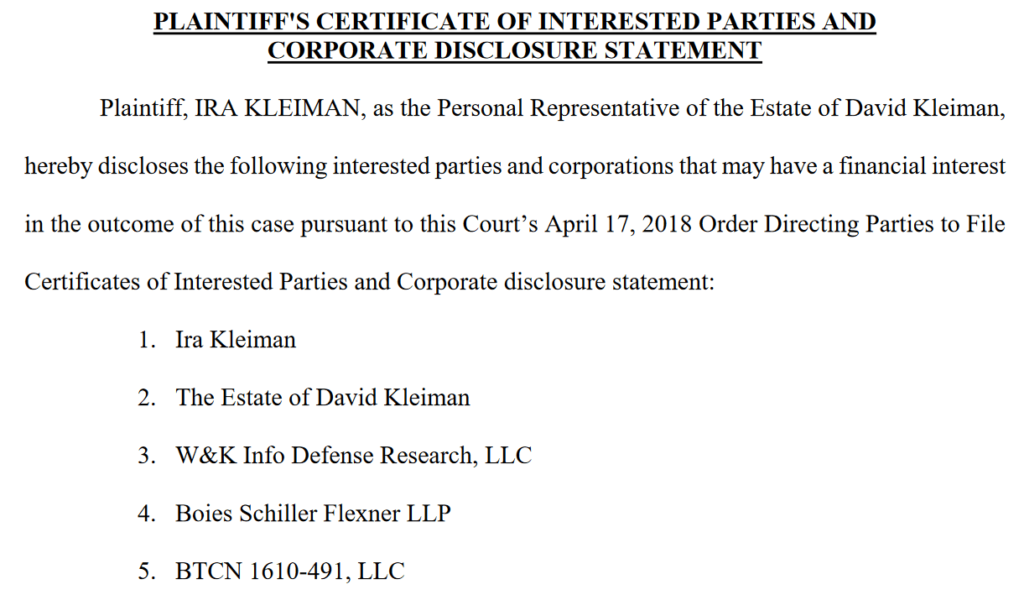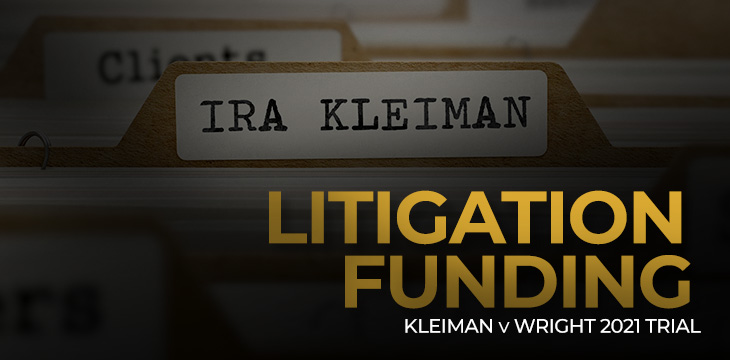Based on everything we know, Dr. Craig Wright is a billionaire. In that light, to find him on the receiving end of a lawsuit isn’t particularly unusual by itself, nor is it unusual that he’s had the resources to meet every challenge in the Florida court with the full power of his defense team over a period of more than four years.
The same can’t be said for Ira Kleiman, who has doggedly pursued Dr. Wright since 2018, filing countless motions and thousands of pages of documents. The legal hours associated with even a moderately complex civil case can be staggering even if it never makes it to trial and if it does, the costs balloon tremendously. Here, we have a complex and document-intensive lawsuit which has dragged on for years and is only just reaching trial. Wealth is of course relative, but based on what we know about Ira it seems almost impossible that he could afford this kind of litigation on his own. Based on his deposition, he’s most recently worked as a self-employed affiliate marketer; before that, he did mostly odd jobs—making a web page, florist delivery, stocking pharmacy shelves, those sorts of things.
So where is the money coming from? There is no federally guaranteed legal aid for civil cases in the U.S., and it doesn’t appear that Ira is using any private aid organizations. Chiefly, that leaves third party litigation funding—in other words, accepting funding from wealthier entities (typically purpose built litigation funds) in return for a cut of the winnings—and potentially more.
The realm of third-party litigation funding is a relatively novel one, particularly in the United States. The exact boundaries of what is permitted and required in cases of third-party funding is still developing and varies state-to-state, and parties are not generally as a rule required to disclose the existence of third-party funders or the details of the funding arrangement unless specifically directed to do so by the court.
We know that Ira was trying for years to secure a financial backer so that he could sue Dr. Wright. In the early filings of the case, you can find emails between Ira and a redacted third party in which Ira offers to increase the recipient’s already sizeable interest in the ‘Bitcoin space’ if they can help him fund a lawsuit against Dr. Craig Wright:

Well, it seems that Ira’s efforts were successful.
As part of the suit, lawyers for both sides were required to file a certificate of, among other things, the parties with a financial interest in the outcome of the case. In addition to the expected appearance of Ira and his lawyers, the list includes a company called BTCN 1610-491:

In his deposition in 2019, Ira was asked about this company: amidst some objections from his attorneys, Ira said that he believes the company is related to Parabellum, a well-known litigation funder founded by the former heads of Credit Suisse’s litigation funding arm.
Though he initially wasn’t allowed to say whether he’d received money from either BTCN 1610-491 or Parabellum, he did admit to having met and shared his complaint against Dr. Wright with them, but interestingly, for much of the deposition, Kleiman not only wouldn’t confirm whether he had received litigation funding from BTCN or Parabellum, he didn’t seem to be confident either way, and seemed to have little knowledge of what documents may or may not have been exchanged with the companies.
It was only after a recess that the attorney for Kleiman, Vel Freedman, confirmed for the record that BTCN is owned by Parabellum and that Parabellum has provided “litigation financing assistance” in this case. Zack Eisner, a witness for the plaintiffs and the corporate representative of W&K appointed for the purposes of the lawsuit, confirmed in his deposition that Parabellum was the funder, but would not give the details of the funding.
BTCN—and its supposed connection to litigation funder Parabellum—isn’t immediately obvious, beyond the Freedman’s confirmation in Kleiman’s deposition. It is registered in Delaware (the state is a popular location for companies to be incorporated). The company makes use of a corporate agent, so details on its actual personnel are limited. Interestingly though, it was established at the end of 2017—well after Ira had begun reaching out to funders, so it can be implied that the BTCN entity in this case is merely a vehicle for true backers. These seem to be Parabellum in the first instance, because the same corporate agent is used for both the BTCN entity and Parabellum’s other entities which are used to raise capital (for example, Parabellum raised almost $470 million for one of its funds in 2020) but Parabellum raises capital on a relatively as-needed basis—the exact sources of these funds and the agreements that were reached in order to secure them are not public information.
It should be mentioned that there’s no reason that BTCN is the only funder in 2021. The certification isn’t a promise that the list accounts for anyone who ever will have a financial interest in the case, though the court stipulated that the certification be kept current. Litigation funding can also be provided to law firms, not only the plaintiffs themselves, and Roche Freedman (the firm representing Kleiman) are no strangers to convoluted funding arrangements involving the disbursement of digital assets. However, the subject of litigation funding is a dead issue as far as the trial itself goes. Parties agreed in advance of trial that neither side would raise the issue of funding provided that neither does anything to put the question at issue—so more official information on this front is likely not going to be forthcoming.
But that doesn’t mean it’s irrelevant. One of the criticisms of third-party litigation funding is that it deprives a defendant of the chance to face their true accusers. Particularly in the case of Dr. Wright, the mentioning of whose name will inspire visceral reactions—good and bad—from the digital asset community, there can be enormous interests at work in contentious litigation. Certainly, Dr. Wright has found himself facing wave after wave of disinformation campaigns from those who see Dr. Wright and his Bitcoin as existential threats—many of whom go to great lengths to keep such efforts hidden. It seems like Dr. Wright has an inkling of who these backers might be; early discovery motions by Dr. Wright (before the agreement to shelve the issue) requested all information relating to the plaintiff’s communications with Blockstream, Bitcoin Core’s developers, Greg Maxwell, and BTC mining pools, among others. Meanwhile, Parabellum seems as keen to keep Ira’s funding details as closely guarded as the lawyers themselves do, judging by the BTCN charade.
The presence of a litigation funder does have at least one significant benefit for Wright. Remember, the costs of litigation, particularly in such a complex case as this, can be astronomical. Depending on the outcome of the case, the losing party is going to be on the hook for their counterparty’s legal costs. Given, as discussed above, what we know about Ira Kleiman, Dr. Wright wouldn’t normally be able to count on the successful recovery of millions in legal costs. In Florida, provided that the funder has a sufficient level of control over the claim, they may be on the hook for any costs accruing from the lawsuit as though they were a direct party to the case—and Parabellum emphasizes the value-add nature of its funding services with regard to the court cases it involves itself in. That’s to say nothing of the other funders that might be lurking out there—either in addition to or behind Parabellum and the attorneys of Ira Kleiman.
New to blockchain? Check out CoinGeek’s Blockchain for Beginners section, the ultimate resource guide to learn more about blockchain technology.








